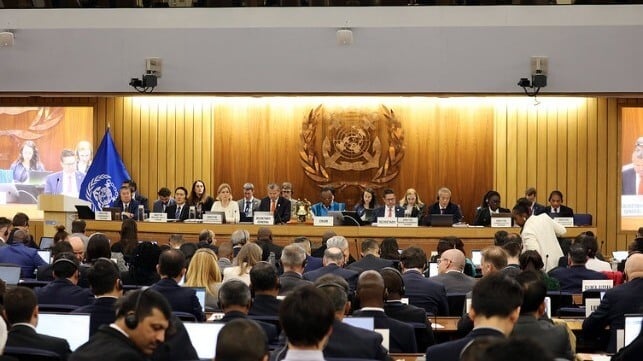Decarbonization Focus Moves to MEPC Working Group After IMO’s Delay

The IMO’s Intersessional Working Group on the Reduction on Greenhouse Gas Emissions from Ships convened as scheduled today, October 20, as the shipping industry remains confused over last week’s decision to adjourn for one year the discussions on the Net-Zero Framework. Some participants are feeling relief while many were disappointed and pointed to the near-term uncertainties that everyone hoped would have been resolved.
The working group, however, is going ahead to continue work on the guidelines for implementing the Net Zero Framework. They will be focusing on key issues related to greenhouse gas emissions as it works to develop consensus and clarifications on the architecture and implementation as well as the planned global fund. Further negotiations are expected on the carbon revenues as well as elements such as the use of biofuels and the supply of alternative fuels.
“The Framework’s success was always dependent on the development of strong and coherent implementation guidelines,” said Dr. Alison Shaw, IMO Policy Manager at the influential NGO T&E (European Federation for Transport and Environment). “This work can continue regardless of the delay.”
Jan Hoffmann, the Global Lead for Maritime Transport and Ports at the World Bank wrote in a social media posting that the delays were “sad news” and “a sad day for multilateralism.” He warned that it “extends uncertainty for the maritime industry, leading to delays in investments in ports and shipping capacity, which will ultimately also mean higher and more volatile freight rates.”
Some parts, however, also expressed their frustration and anger at the members and the IMO. The Ambassador of the Republic of the Marshall Islands who is the Marshall Islands Special Envoy for Maritime Decarbonization, Albon Ishoda, wrote, “Don’t pretend that the Pacific was voiceless; we were ignored, bullied, threatened, cornered, sidelined and harassed…. A year delay is a year of more devastation and displacement for our communities that have nothing to do with this catastrophe. We don’t have the luxury of time. The IMO owe our people an explanation!”
The industry has begun to comprehend the delay while still standing behind the IMO. “Global regulation is essential to ensure a level playing field at international level and to deliver the energy transition of international shipping. We will continue to work with our international partners to ensure an agreement on the IMO NZF can be reached,” said Sotiris Raptis, Secretary General of European Shipowners (ECSA).
The World Shipping Council also asserted that the IMO remains the right place to deliver a global solution. It wrote on Friday after the vote that it is committed to continuing to work with the government to deliver the necessary regulatory consistent for the industry.
The World Shipping Council is urging the IMO to use the time to close the remaining gaps in the agreement. INTERCARGO also reaffirmed its support for the IMO as the sole global regulator capable of delivering coherent and effective measures for international shipping. Similarly, the International Transport Workers’ Federation issue a statement calling for the governments to use the time to rebuild trust and reach agreement on a fair and practical path to decarbonizing shipping.

that matters most
Get the latest maritime news delivered to your inbox daily.
Many shipping companies have already said they will stay the course with their current efforts, while some owners of older ships are feeling a sense of temporary relief.
This week’s session is a closed-door effort. The meeting summary expected from the IMO will provide the first clear signal if the IMO is able to come together and develop a clearer path forward on decarbonization.
